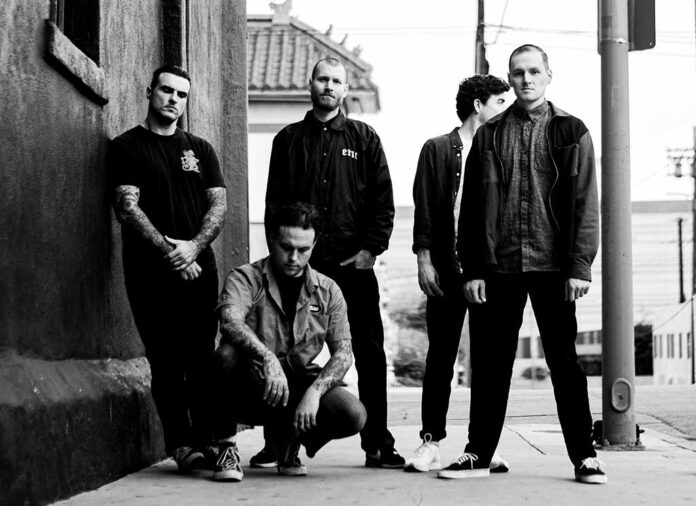
INTERVIEW WITH JESSE BARNETT BY SAMMIE STAR
Stick To Your Guns is a band that has always been confident about the anthemic themes within their music to tell the stories of truths that exist in our lives. Those truths extend beyond the self and into the world around us, and Stick To Your Guns has consistently built upon this metaphor of discovery. External or internal, it is always self-aware and honest, exploring it further with each release.
“We are the universe experiencing itself,” vocalist Jesse Barnett examines. “That’s what makes us so special—humans are a bit more evolved in certain aspects. We exist to question where did we come from? Where are we going? How did we get here? Who we are? I have always felt these are the most important things one can ask themselves. Now, this is also to acknowledge I do come from a pretty privileged place. I grew up in the suburbs. I had all my needs met. I didn’t have to worry about where my next meal was coming from or If I was going to have a roof over my head. Just any of the needs that require a human being to, not necessarily have a comfortable life because everyone deals with different things, but basic human needs. I had those met my entire life. These elements of deep thought come from a place where countless people do not have those things. They don’t have healthcare, they are living outside, they don’t have education, things of that nature. I use this as an opportunity to recognize, dig deeper, and understand for my own purpose to help out the world in any way that I can. That’s ultimately where this rabbit hole of self-actualization derives from.”
“I USE THIS AS AN OPPORTUNITY TO RECOGNIZE, DIG DEEPER, AND UNDERSTAND FOR MY OWN PURPOSE TO HELP OUT THE WORLD IN ANY WAY THAT I CAN.”
For the band’s new album, Spectre, the creative process was not just a vastly diverse and introspective one, but it forced them to go outside the box of their previous release, True View. An album that talked about observing one’s inner self, self-responsibility, and the growth that materializes from that journey, now Spectre turns the page onto exploring a new journey—the American dream. On the outside, it paints a beautiful scenic portrait of one dream available to all, but underneath the paint, the canvas reveals a much different story. It’s a very privileged society, where few get to enjoy its beauty or opportunities for a myriad of reasons. Spectre taps into all facets of that unfairness within the American dream and how deeply scarring it is within our society. To do this, Jesse had to ask hard questions throughout the creative process that forced him to look outside himself and the world around him.
“In order to understand one’s place in the world, you have to understand yourself. In order to do that, you have to ask yourself scary questions. You have to confront yourself in ways that many are afraid to, which I totally get. Our egos get in the way. Our egos do everything they can to protect us from understanding that certain things are your fault, or even understanding that you can improve in some ways,” Jesse pauses. “I think everything leading up to this record was all about broad self-discovery. Understanding myself, my place within my family, my community, my relationships, and ultimately the world. I think what that led me to understand is that the human being is a pretty powerless entity. We always tell each other that, ’One person can change the world.’ I think that is true to a certain extent, but my journey of self-connection has led me to a bigger picture, that connection to those around me, not just people, but the animals and the Earth. I think anyone who cares to look can see that the Earth is dying. My records are not pushing people to have main character syndrome, but I am hoping it pushes people, like it pushed myself within my journey, to hopefully find their place within the community and make them a stronger individual in the collective. I don’t think we will find the answers to our problems if we view ourselves as an island in an ocean.”
“EVERYTHING LEADING UP TO THIS RECORD WAS ALL ABOUT BROAD SELF-DISCOVERY.”
While this was also about looking at the broader spectrum of self-discovery on the world stage, it was also about nostalgic introspection and making a younger version of himself proud.
“Although the anger in this record can seem negative, I’m still the person I was when I was 16. As I turn 35 this year, all I can focus on is making that 16-year-old proud. The naivety and innocence I felt when I started this band, that I could change the world or I could be a part of a solution, I feel a lot of that is lost when you get older. There are people who have positivity, but it’s jaded and bitter. I might express something in urgency, but what I am trying to express is radical love. Sometimes, I can be misunderstood in that, but I hope my point gets across that I believe in human potential so deeply. I know we can do better than what we are doing now.”




















